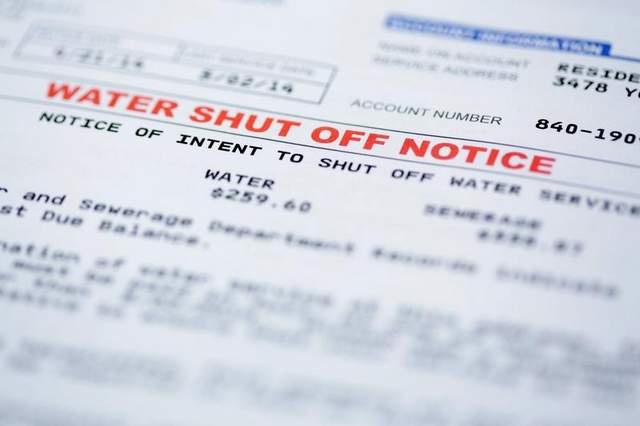Water Arrears Debt
Your water bill is a priority bill and so you should be paying this before considering any unsecured debts.
Can my water be disconnected?

While usually you can’t be shut off, the water company can take action to recover the money owed.
If you are a domestic (non-business) customer, water companies can’t by law, disconnect or restrict your water supply if you owe them money.
If you are a tenant, it’s more complicated.
- If the water bill is in your name;
then it can’t be disconnected. - If the bill is in the landlord’s name;
and your rent covers the water bill; then should the landlord not pay the bill, legal action against the landlord will be taken. Disconnection can only follow if the water company thinks the property is being used for business purposes and no one is living there.
Your landlord is not allowed to disconnect your water supply to get you to pay rent arrears or force you to move.
What happens if I don’t pay my water bill?
The debt will be eventually by passed to a debt collection agency and if this fails a County Court Judgment (CCJ) will follow.
A CCJ can allow you to pay the arrears at a rate considered affordable by the Court. If you do not keep to the terms of the court order further action may follow such as a Warrant Of Control, which means bailiffs will be visiting you.
Help to pay water arrears
Water Direct
The Water Direct scheme to allow those with arrears to pay a fixed amount towards their charges and arrears directly from certain state benefits. This helps many with budgeting and managing their water bills.
To qualify, you or someone living with you, needs to be in receipt of Employment & Support Allowance, Job Seekers Allowance, Income Support, Pension Credit or Universal Credit.
To apply to join this scheme contact your water company.
See also Deductions From Benefits.
Help to pay water bills
Water Sure
The Water Sure scheme is for certain people with a water meter. If you qualify for Water Sure, you will pay no more than the average household bill, no matter how much water you use. This is to make sure you don’t cut back on water because you’re worried about paying for it.
To qualify for help under the Water Sure scheme, you or someone living with you, needs be entitled to receive one of the Water Direct qualifying benefits (see above) or Housing benefit, Working Tax Credit or Child Tax Credit (except families in receipt of the family element only).
In addition, you need to either:
- be responsible for three or more children under the age of 19 and in full-time education living in the property, or
- have (or someone living in the property must have) a medical condition which requires significant additional use of water. Examples of medical conditions include weeping skin diseases (such as psoriasis), Crohn’s disease or ulcerative colitis.
OFWAT is the regulator of the water sector in England and Wales. Their website contains information about your rights a consumer
visit: ofwat.gov.uk
Charitable trusts
If you are facing genuine financial difficulty, your water company may be able to offer you help with your water bill through a charitable trust. These schemes offer financial help to customers who are in debt to their water company. They are normally run independently of the water company. Contact your water company to see if it offers such a scheme.
Payment help schemes
Many water companies have schemes to help those with little chance of repaying all they owe. For example, some water companies will match each payment the customer makes. So for every £1 that the customer pays, the water company will also pay £1 towards their bill. Other water companies ask customers to pay a certain amount for a specified length of time and will then write-off the remainder of the debt.
Your water company should be able to give you more information on any schemes it operates.
Water arrears & IVAs
Water arrears from a previous address and your current address can both be included in an IVA as an unsecured creditor.
Your current ongoing water payments are included as an expenditure item; meaning you’re allowed to budget for this before considering how much you can afford towards your water arrears and any other unsecured debts.
This applies if the debt is subject to a CCJ and/or if bailiffs have been instructed. The exception is if Bailiffs have already entered your home – in which case it is generally too late. [show-iva-cta]